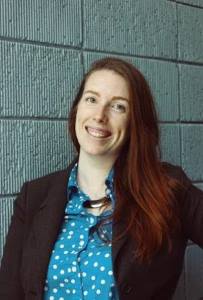
Freshly Minted: Alex Hanam
January 5, 2017
MLIS Candidate, Faculty of Information and Media Studies, Western University
Which information studies program are you attending?
I’m starting my final semester of the MLIS program at FIMS (Faculty of Information and Media Studies) at Western University. I’m also an alumna of the Library and Information Technology program at the Nova Scotia Community College in Dartmouth, Nova Scotia and I’ve worked as a library technician for 8-9 years prior to starting my MLIS.
What are your current classes like? Which is your favorite so far, and why?
My class selections have been a combination of targeting gaps in my skill sets and choosing topics that sounded like fun adventures. Because of my background, I have a strong core foundation in cataloguing, programming, and reference services, and at Western I’ve focused on broader topics applicable to all kinds of information work.
Two of my favourite courses have been Information Policy with Dr. Louis D’Alton and Information Sources and Services with Dr. Paulette Rothbauer. The former provided an opportunity to dive into policy issues like copyright, net neutrality, and privacy, and to complete research on the privacy and security of health-tracking applications. The latter focused mainly on reference resources, but Dr. Rothbauer also facilitated several dynamic discussions on how race, gender, sex, class, and other identity markers operate both within LIS as a profession and between information workers and their patrons. I enjoyed both courses so much because they centred on uncomfortable topics and pushed me to confront difficult questions.
Is there one aspect of the profession that surprises you that you were not expecting when you started the program? What is it?
Though I was peripherally aware of disparity and representation in this profession prior to starting my MLIS, I was surprised to learn truly how wide the gap is between LIS professionals and the communities we serve. This is something I want to work to change, and I strive to amplify the voices and work of Black, Indigenous, and people of colour (BIPOC), of disabled, and queer, and first-generation scholars and workers within LIS, and to support fellow students from these communities. Another thing that continues to surprise me is the tremendous encouragement and support between my colleagues. Librarians always want to help! However, I do have to connect this back to my first comment, in that I feel that in LIS we always want to help and ‘be nice,’ but that our niceness can get in the way. If we are focused solely on being ‘nice,’ we aren’t able to decenter ourselves and place patrons at the center of our work, and as difficult as this work is, it is equally as necessary.
What was it that initially drove you to librarianship?
I was the stereotypical “obsessed with their local public library” child. I was an early and avid reader. My family would bring home crates of books each week from our small rural library, and I would read every single one. Later as a teen, the library (and my activist grandmother) taught me how to channel my passion for equity, and social justice and welfare into concrete activism. Librarianship has been an excellent fit for this.
If you could work anywhere, and do anything with information, what would your dream job look like?
Someone recently asked me a similar question, and my answer was fairly open ended. My dream job is one that gives my work meaning and value outside of monetary measures, allows for a mix of pragmatic and creative responsibilities, and includes mentoring and teamwork. My dream workplace is one that runs on respect and compassion, offers good life-work balance, and gives employees a solid base of benefits and good salaries. I’m very open to where life may take me and to opportunities that may present themselves.
If someone were considering going to library school, what would you advise them about?
I’ve been asked about this many times and I have two pieces of advice I always offer:
- Get experience at any level! Being able to connect course material to lived experience is incredibly beneficial.
- Do your research! Look into potential programs, their faculty, and their context, or what ‘school’ on campus they belong to. Every program has its own take on information work. I chose to attend FIMS because of a focus on critical librarianship that strongly connected to the work I strive to do, but other schools will be attractive for different reasons. Find one that makes you go “Yes!”.
What do you think is the most important aspect of being an information professional today?
As counter-intuitive as it might initially seem to those outside the field, people skills are critical to this work. Whether I work in a public, academic, or other specialized environment, being able to communicate in a manner that is professional, engaging, thoughtful, and compassionate is pivotal to doing information work well. Being an extrovert isn’t the point (and I’m not one); purposefully engaging with colleagues and peers is.
Add a new comment